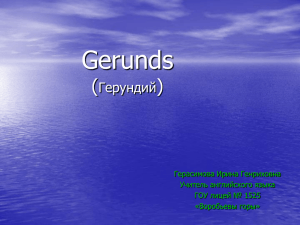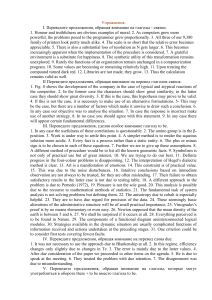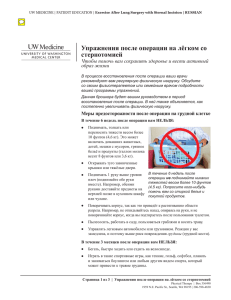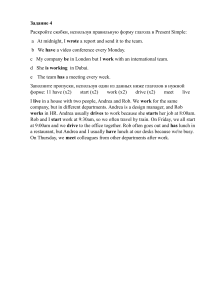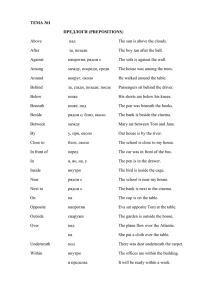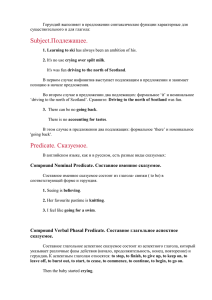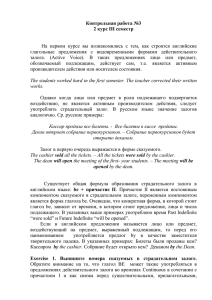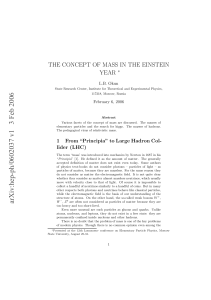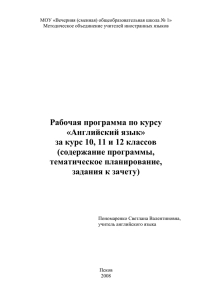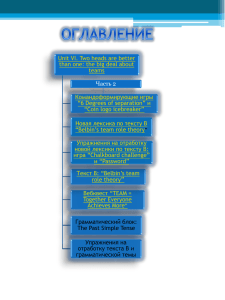Английский язык 11 класс Зачет № 6 Самостоятельная работа 1
реклама
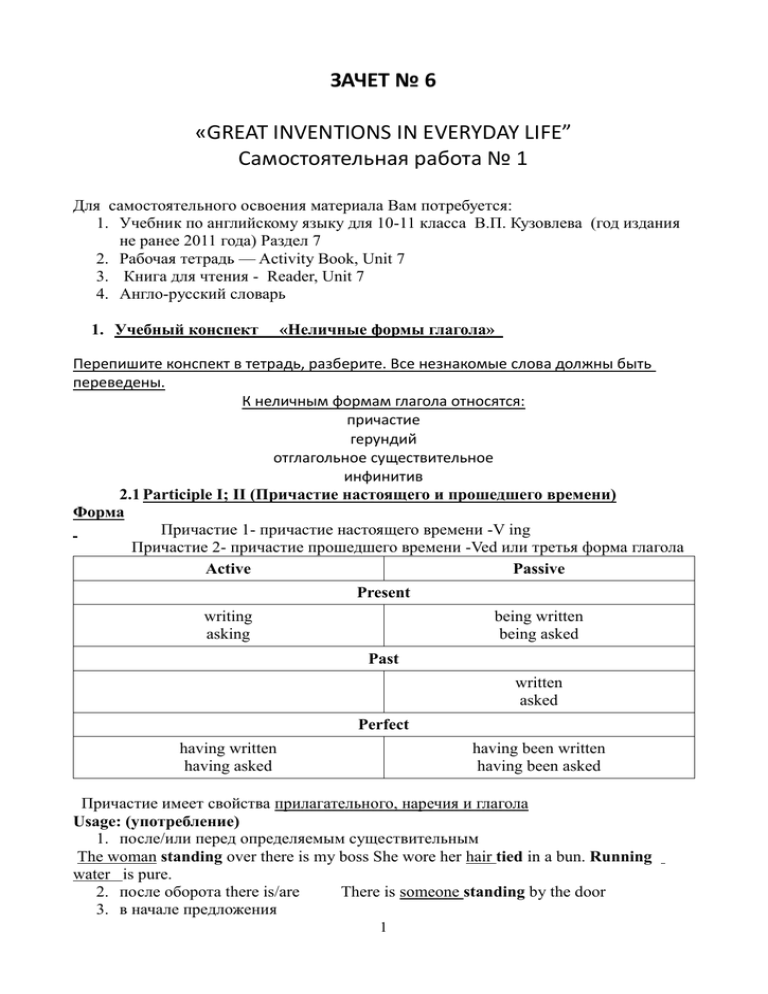
ЗАЧЕТ № 6 «GREAT INVENTIONS IN EVERYDAY LIFE” Самостоятельная работа № 1 Для самостоятельного освоения материала Вам потребуется: 1. Учебник по английскому языку для 10-11 класса В.П. Кузовлева (год издания не ранее 2011 года) Раздел 7 2. Рабочая тетрадь — Activity Book, Unit 7 3. Книга для чтения - Reader, Unit 7 4. Англо-русский словарь 1. Учебный конспект «Неличные формы глагола» Перепишите конспект в тетрадь, разберите. Все незнакомые слова должны быть переведены. К неличным формам глагола относятся: причастие герундий отглагольное существительное инфинитив 2.1 Participle I; II (Причастие настоящего и прошедшего времени) Форма Причастие 1- причастие настоящего времени -V ing Причастие 2- причастие прошедшего времени -Ved или третья форма глагола Active Passive Present writing asking being written being asked Past written asked Perfect having written having asked having been written having been asked Причастие имеет свойства прилагательного, наречия и глагола Usage: (употребление) 1. после/или перед определяемым существительным The woman standing over there is my boss She wore her hair tied in a bun. Running water is pure. 2. после оборота there is/are There is someone standing by the door 3. в начале предложения 1 Arriving at the house he found that all had gone. Situated in countryside, the villa had a wonderful view. Being inquisitive, he always asks a lot of questions Причастие 1 употребляется в функции определения (1,2) или обстоятельства (3) Причастие 1 отвечает на вопросы: What kind of? (Какой?) How? (Как?) Причастие 2 всегда пассивно. Обозначает завершенное дейстие. Употребляется в функции определения, обстоятельства. Может быть именной частью сказуемого. Тренировочные упражнения 2. Упражнения на причастия. Повторите пункт 2.1 конспекта. 1. Переведите предложения. Определите форму причастия The man lay resting after his hard work He met the smiling girl at the very door. The poem, named by the teacher, was known to the whole class There are a few broken chairs in the room. 2. Соедините предложения Example: I saw a baby. It was sleeping. = I saw a sleeping baby. l)They saw children. They were playing. 2) He saw a man. He was swimming. 3) I looked at a girl. She was skating. 3. ВЫПОЛНИТЕ УПРАЖНЕНИЕ, РАСКРЫВ СКОБКИ И ПОСТАВИВ ГЛАГОЛ В Past Participle (Причастие 2), предложения переведите 1. W. Churchill is the famous British statesman ( to know) for his political talent. 2. English is one of the most important languages ( to speak) in the world. 3. The music festival ( to take) place in Edinburgh welcomed many visitors. 4. The films ( to show) on Friday are usually American 4 Выполните упражнение выбрав нужную форму причастия.(Participle I or Participle II) Let's go to work at the plant producing/produced cars The cars producing/produced at our plant this year are quite new. I saw her drawing/drawn a beautiful picture. Let's look at the picture drawing/drawn by Oleg. 2.2 Gerund — герундий Форма герундия- V ing Active Passive Indefinite reading being read Perfect having read having been read Герундию присущи черты существительного и глагола Переводится на русский язык: существительным, инфинитивом, придаточным предложением. 2.2.1.Употребляется после следующих глаголов: To finish, to go on, to keep, to avoid, to enjoy, can’t help, to burst out, mind , can't stand, can't bear, hate, 2 2.2.2. После глаголов с предлогами и глагольных сочетаний: To approve of , to insist on, to succeed in, to look forward to, to depend on, to object to, to thank for, to miss an opportunity of, to feel like, to prevent from, to give up; the idea of… 2.2.3 после выражений to be fond of, to be sure of, to be pleased at, to be surprised at, to be proud of, to be worth, 2.2.4.После этих глаголов возможно употребление инфинитива или герундия. To begin to do ( infinitive) To start doing ( gerund) To remember To like(dislike) To love To intend To continue Обратите внимание на разницу в переводе предложений при употреблении герундия или инфинитива !!! Remember +to + infinitive - I remember to switch off the TV before I left Я вспомнил, что надо выключить телевизор перед уходом !!! Remember + V-ing - I remember switching off the TV set before I left Я помню, что выключил телевизор перед уходом !!! He stopped to talk – Он остановился, чтобы поговорить !!! He stopped talking- Он прекратил разговаривать 2.2.5 Infinitive - инфинитив Форма: глагол с частицей «to» ( или без нее) Встречается в конструкциях: 1. Complex Object - сложное дополнение ( стр 269-270) Verb+ object + to Infinitive Эта структура используется после глаголов: To want, to consider, to ask, to help, to expect, to believe, to tell, to mean , to order, would like, to remind, would prefer, o know, to warn, to think, to force, to forbid, to persuade, to invite, to teach Rick asked me to help him. Sarah helped him ( to) design the poster. Обратите внимание на то, что после этих глаголов инфинитив употребляется без частицы «to” To make To let To hear To see do smth He makes me laugh. ( после этих глаголов частица “to” не употребляется! 3 Тренировочные упражнения Обратите внимание на способы перевода герундия. (Пункты 2.2,2 2.2.4 учебного конспекта.) 1. 2. 3. 4. 5. 6. 7. On seeing the funny toys the child began laughing. Why don't you do the work properly without being reminded? I remember telling him my story Do you prefer going to the cinema or watching TV? This film is worth seeing. They stopped laughing when they saw me. Reading books is useful. 3. Учебный конспект « Времена Английского глагола. Пассивный залог» Поработайте с грамматическим комментарием к учебнику на стр 266 и заполните таблицу, вписав в нужную клетку форму глагола в пассивном залоге Past Прошлое Present Настоящее Future Будущее Simple Passive Простое Continuous Passive Длительное Perfect Passive Завершенное Обратите внимание на временную форму Past Perfect Passive . Она образуется с помощью had been + Participle II (V3) Используется для описания действий, которые были совершены до определенного момента в прошлом. Составьте конспект используя текст на стр 267 (учебник) Обратите внимание на использование союзов When/ after c Past Perfect Passive Тренировочные упражнения на употребление времен в пассивном залоге Преобразуйте предложения в разных залогах Active Passive 1. They make VW cars in Germany. 1.VW cars _____________________in Germany 2. They _________________rice in 2.Rice is grown in China. China 3. Bell invented the telephone in 1876. 3.The telephone ______________ by Bell 4. Thieves ____________two pictures in 1876. from the museum last night. 4.Two pictures were stolen from the 5. They have built 3 factories this year. museum last night. 6. They _________the picture for 3.000$ 5.Three factories ___________this year. 4 7. The factory will produce 10 thousand cars next year. 8. _________they ________many cars last year? 9. Bell didn’t invent the television. 6.The picture has been sold for 3.000$ 10 thousand cars 7.____________________ next year. 8.Were many cars made last year? 9.The television _____________ by Bell. Выполните упражнения в учебнике на стр 228-229. Преобразуйте предложения, поставив глагол в пассивную форму (Past Simple Passive) Проработайте эти временные категории в пассивном залоге. Внимательно изучите таблицу, приведенную ниже и обратите внимание на форму глагола в Past Simple / Present Perfect пассивном залоге Active Passive Past Simple The customs officers examined our luggage yesterday Past Simple Our luggage was examined yesterday Present Perfect The typist has just typed the letter Present Perfect the letter has just been typed Выполните упражнение. Используя таблицу, раскройте скобки и поставьте глагол в нужное время и пассивную форму (Past Simple Passive/ Present Perfect Passive) 1) After the accident he ( to take) home immediately. 2) Many new houses (to build) in our city lately. 3) This bridge (to build) in 1945. 6. Прочитайте текст. Это некоторые факты из жизни выдающегося ученого Альберта Эйнштейна Подумайте над эпиграфом. Какое значение имеет глагол «count” Genius or slacker? Гений или бездельник? “Not everything that counts can be counted… …and not everything that can be counted counts.” Albert Einstein 1. When he was a baby, Einstein was very slow to talk. When he was nine years old he didn’t speak well. His parents were worried. Was he less intelligent than normal? 2. Einstein left high school at 15. He didn’t like classes. Students just repeated and memorised information. He preferred to study at home with books on mathematics, physics and philosophy. 3 When he was 17, Einstein wanted to study at the Federal Institute of Technology in Zurich, Switzerland, but he didn’t pass the entrance examination. 4. Einstein was not a good student at university. He didn’t go to classes and he worked in the library and laboratory. He studied a friend’s class notes to pass exam. 5 5. He finished university in 1900. He didn’t have good results and couldn’t find a permanent job. He did small jobs for the next two years. 6. Einstein published three revolutionary scientific papers in 1905. He was not a professional physicist, and he did his scientific investigation in his free time. 7. Einstein became a celebrity after he won the Nobel Prize in 1921. One of his biggest fans was Marilyn Monroe. Marilyn thought they could have the perfect child – beautiful and intelligent. 8. Einstein’s other passion was music. His mother encouraged him to play the violin, an instrument that he played all through his life. 9. Einstein’s famous formula E=mc 2 demonstrated that the atomic bomb was possible. But in the last years of his life, Einstein actively protested against the atomic bomb. 10. Einstein was not only a theoretical scientist, he was also an inventor. In 1926 he invented a fridge that worked with alcohol. 11. Einstein was also famous for his ability to make very intelligent comments about life. One example is^ “ You don’t really understand something unless you can explain it to your grandmother” 12. Einstein’s brain was smaller than normal because he was a small person. After he died, a doctor stole his brain to discover the secrets of his intelligence. 9. Письменная речь. Write a “thank you” postcard to your foreign friend and explain why you liked the present. Напишите открытку с благодарностью за подарок и объясните почему он вам понравился. Посмотрите на образец, обратите внимание как написан адрес, а потом попытайтесь сделать задание, используя образец. Образец: Dear Mark, Many thanks for your congratulation and present. It is just I wanted. As you know, music is my hobby. “Steam” is the sensational album. I enjoy listening to it. I think you will be able to come here in summer. I also expect you to make a great progress in your Russian Best wishes, Sasha Mark Bignold 29 Weybrook Drive STAMP Guilford GU1 1EZ England Обратите внимание на оформление адреса получателя открытки. Сначала пишется имя получателя, номер дома, улица, название города и почтовый индекс и только в конце страна. Прочитайте текст письма. Обратите внимание, что после обращения, ставится запятая. Каждая новая мысль пишется с красной строки. Обратите внимание на заключительную фразу письма. О правилах 6 оформления личного письма и формулах приветствий и окончания письма Вы уже встречались в Самостоятельной работе 2 к зачету № 5. 10.А теперь попробуйте написать открытку с благодарностью Вашему другу за подарок . Адрес и необходимые данные приведены ниже. Your friend's name Your friend's address PETER BAILIE CANADA VSC 4H9 COQUITLAM NORMAN AVE. # 73 2905 country ZIP (postcode) City Street APT No POSTCARD TO FROM Вы можете использовать слова и выражения из упражнения № 2 на стр 225 учебника или использовать подсказку внизу: фотоаппарат- camera фотография-photography полезный подарок- useful present фотографировать – take photos - сделать много хороших фотографий -make a lot of good photographs - посетить достопримечательности -visit interesting places встретить приятных людей -meet nice people 11 Понимать инструкции к различным приборам очень важно. Прочитайте тексты на стр 246 и определите к каким приборам они даны. Упр 2(1) стр 246 учебника. Выпишите, что означают следующие слова: to unplug, to avoid, to touch, to burn, flammable to circulate, to remove to fit, appropriate, to prevent,. 7
